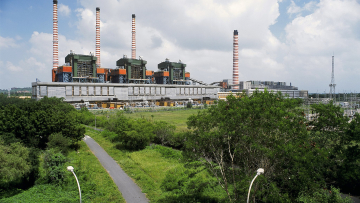Standard Chartered announces exit from three coal plant projects and phase-out of corporate support for coal

Today Standard Chartered has announced that it will withdraw from the lending consortia for three new coal-fired power plant projects. The move was applauded by NGOs which have been calling on the London and Hong Kong-headquartered bank to do so since it introduced a prohibition on direct financing for new coal-fired power plants in September 2018, yet chose to remain in the three projects, two of which are located in Vietnam. 1
Standard Chartered’s announcement also includes a new coal phase-out commitment covering all financial products and services which should see the bank ending its support for thermal coal dependent companies by 2030. With this policy revision, Standard Chartered becomes the most advanced major UK-based bank in terms of explicitly restricting general corporate support to coal clients.
However, the interim restriction targets the bank has set between 2021 and 2030 are noticeably weaker than those introduced by various other European banks which have chosen to clamp down more firmly and rapidly on the industry most responsible for driving climate change. 2
Bernadette Maheandiran, Legal Analyst at Market Forces in Australia, said:
“Standard Chartered has made a welcome decision to close the loopholes in its policy by pulling out of the lending consortia for three new coal-fired power stations in Southeast Asia.
"The controversial and polluting Vung Ang 2 and Vinh Tan 3 projects in Vietnam continue to stand in the way of Asia's path to clean energy, breathable air and a safe climate. Standard Chartered's move should send a signal to other banks, including DBS, MUFG, Mizuho and SMBC, that building coal is financially risky, environmentally and socially unsound and morally reprehensible.”
Research published earlier this month by BankTrack, urgewald and 350.org revealed that over the last three years Standard Chartered has been the biggest UK bank supporter of companies actively planning to develop new coal plants. The bank’s $8.56 billion support for these companies, including some of the world’s most aggressive coal power expansion companies, has predominantly been done via general corporate lending and the provision of underwriting services.
Greig Aitken, Climate campaigner at BankTrack, said:
“Hats off to Standard Chartered for making these new commitments which underscore once again that the coal industry is on its last legs. The bank’s decision to get out of the coal plant projects in Vietnam will be a boon to local communities and campaigners who are fighting hard to resist deeply unpopular coal. The other banks still involved in the financing of these projects must follow Standard Chartered’s example by changing course and acting responsibly in the face of an industry desperately hanging on for life support.
“It’s also encouraging to see Standard Chartered move the needle in the context of the UK banking sector’s still rampant appetite for profit-making off coal. In the last three years as the climate crisis has intensified, Standard Chartered, HSBC and Barclays have provided and facilitated over $20 billion between them for coal expansion companies such as NTPC of India and PLN Persero of Indonesia.
“Standard Chartered’s new restrictions on coal, while they don’t go deep and fast enough, do however start to address the real problem behind the UK’s dirty coal secret, corporate-level financial support. The UK’s big three banks now have 11 months before the UN climate conference in Glasgow to get their houses properly free of coal.”
Notes for editors:
1. See information on the Vung Ang 2 and Vinh Tan 3 coal plant projects in Vietnam, two BankTrack ‘Dodgy Deals’. Standard Chartered has not clarified to NGOs the identity of the third coal plant project.
2. The updated Standard Chartered approach to fossil fuel power is available here. The bank states:
“We will only provide financial services to clients who:
· By 2021, are less than 100% dependent on thermal coal (based on % EBITDA at group level);
· By 2025, are less than 60% dependent on thermal coal (based on % EBITDA at group level);
· By 2027, are less than 40% dependent on thermal coal (based on % EBITDA at group level);
· By 2030, are less than 10% dependent on thermal coal (based on % EBITDA at group level).”

